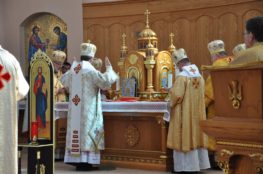His Beatitude Sviatoslav, head of the Ukrainian Greek Catholic Church (UGCC), has issued an open letter concerning the situation in Ukraine and the persecution of Greek and Roman Catholics, along with Protestants and non-Moscow Patriarchate Orthodox, in the so-called “separatist region” of the country. The letter also addresses the stream of invective which has been flowing out of the Moscow Patriarchate (MP) recently. Here is an excerpt:
Amidst the horrors of war the tiny Ukrainian Greek and Roman Catholic minority experience oppression on the territories controlled by the “separatists.” Three Catholic priests were kidnapped: Pawel Witek and Wiktor Wąsowicz (Roman Catholic), Tykhon Kulbaka (Greek Catholic). The later was kept in captivity for 10 days and deprived of medicine he needed. The episcopal residence of the Greek Catholic bishop in Donetsk was robbed and sealed, depriving him of his chancery and all documentation. The Cathedral yard was hit by “separatist” rocket fire damaging the building and windows with shrapnel. The bishop and almost all Greek Catholic priests were forced to leave the environs of Donetsk. Armed representatives of separatist regime entered the church and desecrated the sanctuary. They “allowed” priests to stay and conduct services but put them on travel restrictions. Terrorists blackmail the clergy by threatening to harm their parishioners.
Most recently, on Saturday, August 16, the small monastery of the Sisters Servants of Mary Immaculate in Donetsk was seized and violated. The sisters who generously and humbly served the community and who were on a summer retreat or at summer camps for children outside of Donetsk cannot now return to their home now being used by the “separatists.”
Protestants are targeted by pro-Russian terrorist groups and have suffered the gravest violence: two sons of the pastor of the Evangelical Church “Metamorphosis” Alexander Pavlenko and two deacons of that church, Victor Brodarsky and Vladimir Velichko were taken from a church service, tortured, and killed by the terrorists. Their bodies were exhumed from amass grave in Sloviansk.
Unfortunately, the beleaguered Ukrainian Catholics, Greek and Roman, faithful of the Ukrainian Orthodox Church of the Kyivan Patriarchate and Protestants in the east of Ukraine are further endangered by the rhetoric of the Orthodox leadership in Russia, which is becoming increasingly similar to the propaganda of Russian political authorities and media.
In recent documents issued in Moscow at the highest level of the Russian Orthodox Church, particularly in a letter to the Primates of the Orthodox Churches, Greek Catholics and the Ukrainian Orthodox of the Kyivan Patriarchate, disrespectfully called “Uniates” and “schismatics”, are defamed. They are held responsible for the military conflict in Eastern Ukraine and are accused of generating the warfare, especially the violence against Orthodox clergy and faithful endured as a result of military operations. Russian Orthodox leaders spread libelous information about Greek Catholics and other confessions thereby putting them in danger from the separatist militants who identify themselves as warriors for Russian Orthodoxy.
Although there are, understandably, a lot of bitter feelings right toward the Russian Orthodox Church, let us not forget that the faithful of this confession, though separated from the Catholic Church, endured nearly a century of violent persecution at the hands of the Soviet state. That is one reason why the rhetoric if the MP is do depressing; it is a betrayal of the memory and witness of the Russian Orthodox martyrs who would not lay down their faith to be trampled upon by state-backed violence. The UGCC, too, suffered terribly under communism, though the memory of their suffering — which in no small part benefitted the “official” Orthodox Church — has never been acknowledged by the MP. When the UGCC emerged from the catacombs in 1989, it did so with hundreds, if not thousands, of clergy and millions of followers. Why? Because it had not capitulated; it had kept the Faith pure and unbiased by ideological interests. Sadly, the MP couldn’t say the same. After the year 2000, however, there was hope that the situation had changed and that the Russian Church was no longer the handmaid of the Russian state. Can anyone honestly hold such a view today?



